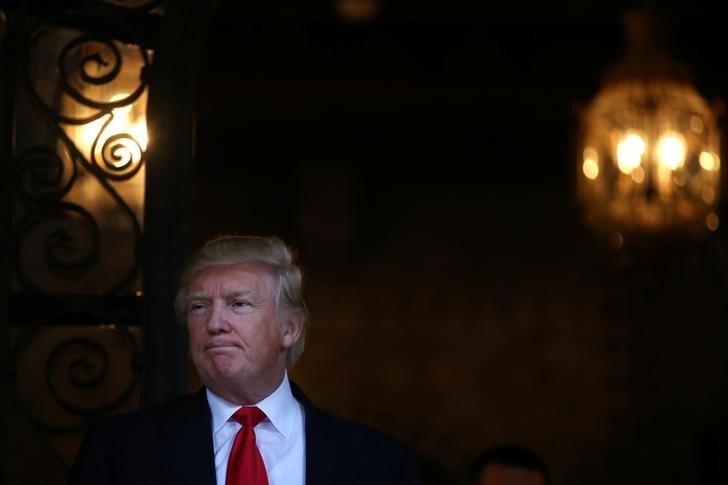By Mark Hosenball and Steve Holland
WASHINGTON (Reuters) - There is disagreement within President-elect Donald Trump's camp about the structure of the top U.S. intelligence agency when he takes office and it is unclear whether his national security adviser will prevail in advocating a reorganization, sources familiar with the matter said on Thursday.
At issue is the Office of the Director of National Intelligence (ODNI), which Congress created after the Sept. 11 attacks to better coordinate the efforts of U.S. intelligence agencies to protect the United States.
Trump security adviser Michael Flynn, who as head of the Pentagon's Defense Intelligence Agency under President Barack Obama sometimes clashed with other intelligence agencies, favors restructuring and paring back the ODNI, the sources said.
But one source close to the Trump transition cautioned that the outcome is not certain.
"There is a general consensus that the ODNI is too big and grown too fast. Some around him (Trump) believe this, but whether they plan to address it or how, I just don’t know," said the source, who like others requested anonymity to discuss the Trump team's internal deliberations.
Flynn has had a fraught relationship with the ODNI. After complaints over his management style at the Defense Intelligence Agency, he was fired by Director of National Intelligence James Clapper.
A senior transition official told Reuters on Thursday that Trump has picked former U.S. Senator Dan Coats as his director of national intelligence - a sign Trump does not plan to try to eliminate ODNI.
A U.S. official familiar with Coats' views suggested he would not move precipitously to overhaul U.S. intelligence agencies.
"Any possible reforms to the structure of the intelligence community, he would approach with great caution and responsibility," the official said.
Relations between Trump and U.S. intelligence agencies are extraordinarily rocky even before he is sworn in on Jan. 20.
Trump disparaged the spy agencies' conclusions that Russia was behind hacks of the Democratic National Committee and the campaign staff of his 2016 election opponent Hillary Clinton. Clapper told Congress Thursday he was "even more resolute" that Russia staged cyber attacks, rebuking Trump's skepticism.
Trump was scheduled to be briefed on Friday on an intelligence report that reaches that conclusion. Russia has denied the hacking allegations.
"I think the president-elect is more skeptical of the conclusions that are drawn from the raw data rather than the intelligence in the raw data that's provided," Trump spokesman Sean Spicer told reporters on Wednesday.
Coats, according to another U.S. official familiar with his views, said he knew a lot about Europe and Russia and may well "butt heads with Trump over Russia."
The Wall Street Journal reported on Wednesday that Trump is working with top advisers to restructure and reduce the size of the ODNI.
That report largely reflects the views of Flynn, said a source familiar with the retired lieutenant general's thinking who declined to be identified.
Trump spokesman Sean Spicer on Thursday rejected the report.
"There is no truth to this idea of restructuring the intelligence community infrastructure," Spicer said. "All transition activities are for information gathering purposes and all discussions are tentative."
A broad intelligence reorganization would require congressional action. Congress created ODNI in a 2004 law that makes it the parent of 16 other U.S. intelligence agencies, ranging from the CIA and the DIA to the eavesdropping National Security Agency and the State Department's intelligence bureau.
Flynn, who served as a top military intelligence officer in Afghanistan and Iraq, is said by those familiar with his views to favor major changes at the CIA as well.
Both on the battlefield and at the DIA, Flynn pushed for intelligence personnel to be moved out of compounds and offices and closer to front lines, where Flynn believed they would be more effective intelligence collectors, said the source familiar with his views.
Flynn would like the CIA to reorganize itself along these lines, the source said. The CIA was just reorganized last year, however, to bring frontline spies and backroom analysts together in new units focused tightly on specific issues or regions.

Republican congressman Mike Pompeo, Trump's choice for CIA director, is known to share Flynn's views about the need for restructuring at CIA, the source said. But two other people familiar with Trump transition discussions said Pompeo has not been involved in talks about possible CIA reorganization.